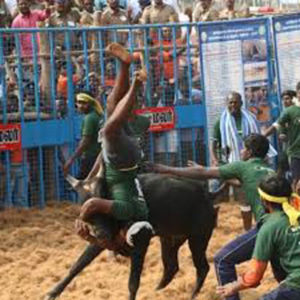NE NEWS SERVICE
NEW DELHI, DEC 9

With the harvest festival of Tamils, Pongal, a month away, holding the ancient game of jallikattu or bull-taming will remain an unresolved puzzle for brave Tamil youth as a five-judge bench of the Supreme Court Thursday reserved its judgment on a bunch of petitions seeking to strike down a Tamil Nadu law that protects Jallikattu.
It is a popular bull-taming sport, by claiming that it is a cultural heritage of the state and protected under Article 29 (1) of the Constitution.
The sport was banned by the Supreme Court in 2014. In its detailed report before the apex court, animal-rights group PETA India, which is one of the petitioners, said at least 23 bulls and 86 humans have died, while 6,351 people suffered injuries, ever since jallikattu was legalised by the Tamil Nadu government in 2017.
The Animal Welfare Board of India, PETA India, Compassion Unlimited Plus Action, Animal Equality and Federation of Indian Animal Protection Organisations have challenged the legalization of jallikkattu..
“Bulls were viciously hit, whipped with ropes, and jabbed with nail-tipped wooden sticks. Participants also bit the animals’ tails, which they twisted, yanked, and broke, in order to provoke them,” PETA said as part of its investigation into the sport.
The Tamil Nadu PCA (Conduct of Jallikattu) Rules, 2017, outlines several rules for the sport, which PETA claims have been flouted.
One of these rules states that the sport needs to be conducted in open grounds, but the PETA India report highlighted that in some districts, the competition was held inside villages, town centres, streets or narrow by-lanes.
Another rule outlines that the bulls should be provided a minimum rest period of 20 minutes before being brought into the arena, and should be given adequate space of 60 square feet when waiting in their enclosures.
But the PETA India report claims that not only were the bulls made to stand for 16 hours to wait their turn, they were also squeezed in queues without being provided any food or water.
The PETA investigators also noted that many bulls entering the arena had injuries and mutilations like cut ears or bleeding nostrils.









